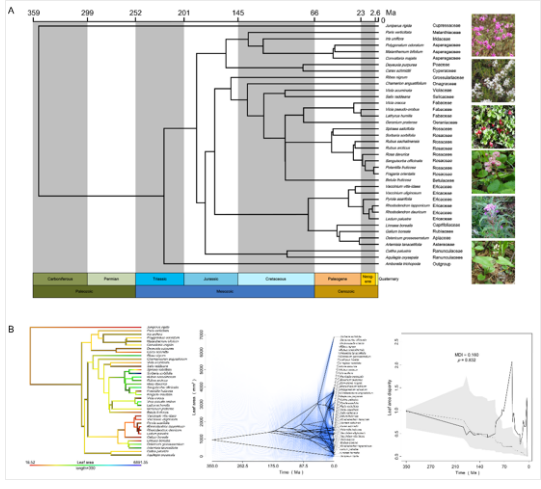How Functional Traits Diversified and Phylogenetically Correlated for Co‐occurring Understory Species in Boreal Forest?
Determining the processes and mechanisms underlying the community assembly is a favorite past time for ecologists.
During the past decade, functional trait-based approaches have been widely used to test mechanistic community assembly hypotheses through quantifying functional patterns, which could reflect different ecological processes acting on community assembly with diversified evolution of functional traits.
Although ecologists have predicted how variation in functional trait values affect species interactions, community composition, and ecosystem functioning, the diversification and phylogenetic correlation of functional traits for the co-occurring species within a community over geological time are often unknown.
LIU Bo from Institute of Applied Ecology, Chinese Academy of Sciences, together with his collaborators, utilized phylogenetic comparative analysis to examine how functional traits diversified and phylogenetically correlated for co‐occurring understory species. The researchers measured six functional traits for 37 boreal understory species in the field, including leaf area, leaf carbon content, leaf dry matter content, leaf nitrogen content, plant height, and specific leaf area. They constructed a phylogenetic tree with three loci (rbcL, matK, and trnH-psbA) to perform phylogenetic comparative analyses.
The results of low levels of phylogenetic niche conservatism for the measured understory traits indicated species co-existing in a local community do not necessarily need to share similar functional traits, namely trait diversification. In addition, there were both positive and negative phylogenetic correlations among the six measured traits during the processes of trait diversification.
The results suggest that those understory species are distantly related in phylogeny and have both positively and negatively correlated adaptions, corresponding to resource acquisition strategies under the harsh environmental conditions and fire disturbance.
The study entitled “Diversification and phylogenetic correlation of functional traits for co‐occurring understory species in the Chinese boreal forest” was published in Journal of Systematics and Evolution on February 16.
The work was funded by the National Natural Science Foundation of China, Natural Science Foundation from Science and Technology Department of Liaoning Province, and the Top‐notch young talents project of Liaoning Province “Xing Liao Talents” Project.

Fig. 1 Phylogeny of understory species observed in a northern Chinese boreal forest (A). Background colors represent geological periods. Plot of leaf area at the tips of the understory phylogenetic tree along with the reconstructed ancestral states; the reconstructed ancestral states for leaf area using maximum likelihood; disparity through time (DTT) and associated morphological disparity index (MDI) for leaf area (B) (Image by LIU Bo).
Contact
YUE Qian
Institute of Applied Ecology, Chinese Academy of Sciences
Tel: 86-24-83970324
E-mail: yueqian@iae.ac.cn



